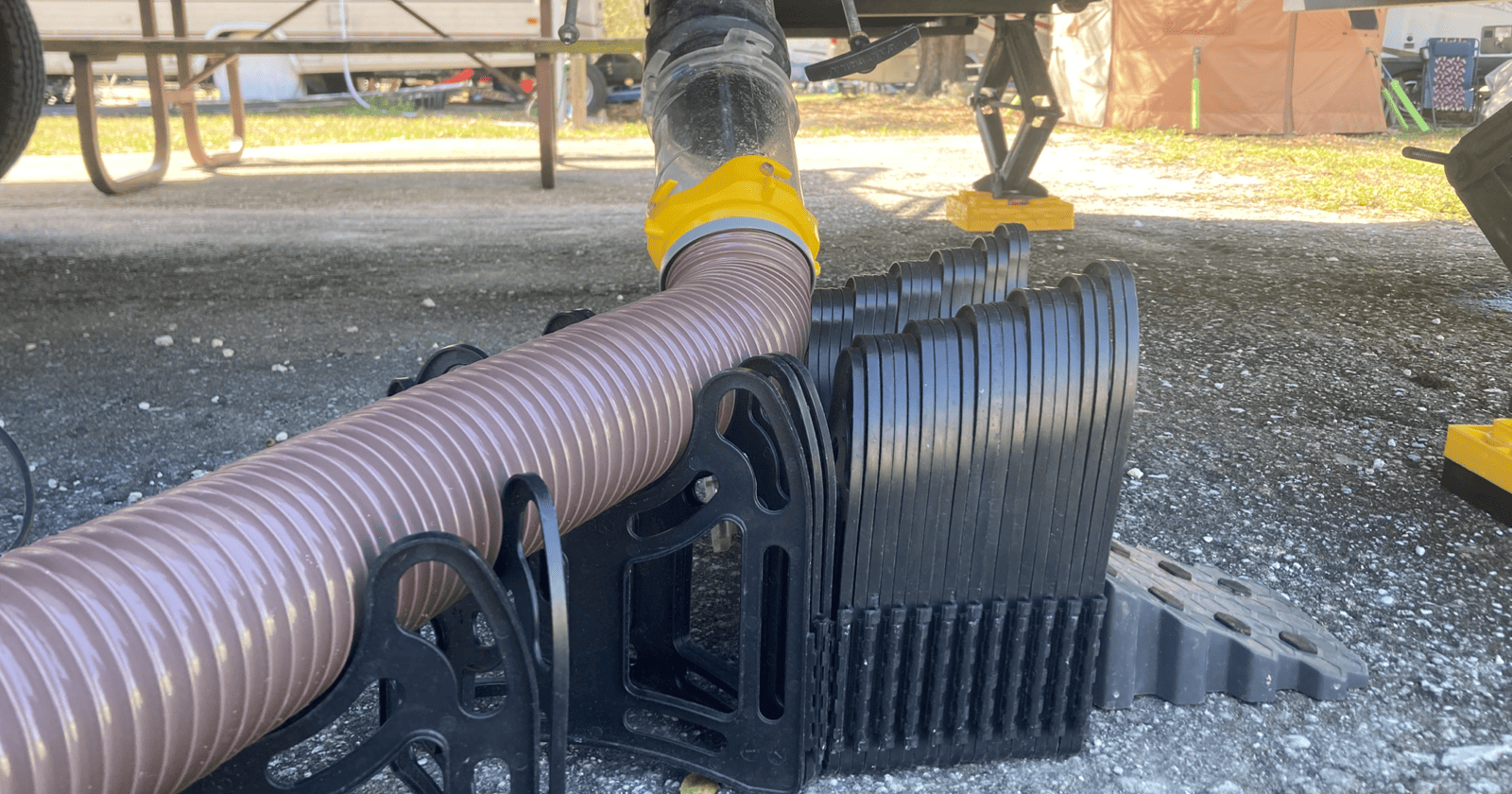You just came back from a three day drive and you are exhausted. At your last fuel refill, you couldn’t find a dump station to empty your black or grey tanks. All you want to do is go to bed and not turn around to take your RV back out to find place to empty your tanks… There are ways to dump RV waste at home.
Dumping RV Waste at Home
Septic Tank
Every septic system has a clean out pipe that should be located near the house. It could be a PVC or metal pipe sticking out of the ground. It is normally used when your septic tank maintenance company comes out to do their cleaning service for you.
With the proper fitting, you can attach the end of your sewer hose to the cleanout pipe. Make sure you secure a solid seal to avoid messy situations. You can go to your RV store and buy a sewer fitting for a relatively inexpensive cost.
Once that is set, you can then connect the sewer hose to your waste valves on your RV, and pull the valves. If your RV is high enough, and the land between is flat or sloped down, you should not have a problem with flow. Otherwise, you can also purchase a Macerator Pump which will pull the waste out of your tanks.
City Sewer
For your city sewer, instead of a septic pipe sticking out of the ground, there is a cleanout access port coming out of the house that should be buried within four inches below ground. Use your shovel to poke around the perimeter of your house to locate it. Usually, there is a straight line between your house and the street where the city sewers connect to your house-pipe.
Once your find your access port, you can connect your RV waste hose to the access port just like a clean out pipe of a septic tank. If you want to do this, first check with your city to find out if it is legal. Some municipalities do not want you to do this.
The access ports are not exposed to open air. As a result, there is a build up of toxic fumes in the pipes that can be deadly to humans. Make sure you have someone with you when accessing the ports.
Chemical Concerns
Avoid Toxic Chemicals
When you dump RV waste at home, be careful with what is going down the drain when dumping into your septic system. Your septic system has its own ecosystem where it uses bacteria to breakdown your waste.
There are two different types of bacteria in your tank. Aerobic bacteria needs oxygen to survive. Anaerobic bacteria only requires low levels of oxygen. Each type breaks down different waste materials. Both are required in your septic tank for it to work properly. Cleaning products, oils, and other toxic chemicals can kill the bacteria, making your septic system useless.
Black Tank Treatments
Regular maintenance of your RV requires that you add treatments to your black water tank. The chemicals break down solid waste and tissue in order to prevent clogs from happening when you empty them out. They also work as a deodorant from the harsh fumes of the tank.
The treatments come in liquid, tablet or pouches. Each have their own advantages. Some like using liquid treatments due to the added benefit of deodorizing the grey tank. Others prefer the tablets or pouches since they are less messy.
If you know that you will be draining your black tank into your home septic system, avoid using the pure chemical versions. These chemicals, that are usually blue in color, contain formaldehyde which is very acidic. After prolonged use, it can eat away at your septic system pipes and kill the bacteria.
There are RV black tank treatments that use bacteria instead of formaldehyde. The bacteria in the treatments work just as well and won’t harm your septic system. Non-chemical treatments, usually have the word “Bio” in the label. The bacteria in the bio treatments will not harm your septic tank bacteria.
Portable Tank Option
Containers
If you can’t dump RV waste at home through your exterior pipes, there is another way. There are portable waste tanks you can buy to transport it to a dump station. Manufacturers add wheels and handles to assist with moving them around. Waste containers can vary from 10-40 gallons. Make sure you purchase enough tanks that can hold both your black and grey water to avoid multiple trips to the dump station. There are adapter ports designed to connect your sewer hose directly to them.
Many boondockers/dry dockers keep one or two of these around to transport their waste to a dumping station. The tanks are low to the ground and fit underneath your camper to allow gravity to empty your tanks. If you need additional suction, you can also use a Macerator Pump to make sure your tanks empty out completely.
Once filled, the portable tanks can be rolled into a pickup truck bed via a ramp. Some of them can even be towed, to keep them out of the interior of your vehicle clean. When towing them, take it slow. They are not made for regular cruising speeds.
Once connected to the dumping station, connect your sewer hose, or their built in sewer hose, to the dump station and let gravity empty the container. As things empty, you can tilt them until empty. Once empty, use a water hose to clean your portable tank out.
Finding Dump Stations
Some dry dock campsites have septic tanks on site to dump RV waste. If not, there are websites and cellphone apps you can use to locate dump stations in your area. Some of which are Map of RV Dump Stations or Sanidumps. The websites allow the user to locate dump stations based on the zip code they are in. They can also give you locations in Canada as well.
- Information you can find on these websites is very thorough.
- Name of location (name of campground or travel center)
- Physical address of the location
- GPS coordinates
- If there are fees or dumping is free
- Any additional information
Locations that normally have RV dump stations are usually developed campgrounds, RV dealerships and Travel Centers off of highways. Travel centers like Pilot/Flying J, TA or Love’s may charge you to use their RV service facilities. Signing up for their rewards programs can give you access to lower rates. Also, some RV clubs created affiliations with other companies to offer loyalty discounted prices. One example is the arrangement Good Sam’s Club made with Pilot/Flying J. Members of the club can get discounts on RV services, fuel and other amenities at this travel center.
Additional Information
When dumping RV waste at home, you want to cycle your black and grey tanks regularly. Residential septic tanks can’t handle a large quantities at once like campground septic systems. If hooked up long term, dumping your tanks every few days or weekly is the best way to not overload your system.
Semi-Permanent Setup
If your RV is going to be set up on your property long-term, instead of using the flexible sewer hoses, you can use PVC piping to make a more permanent connection from your coach to your clean out pipe. If you do this, make sure it can be detached for your septic tank service provider so that they can maintain your system.
What Is a Macerator PUMP
Macerator pumps do two different things. The first is it can grind up your solid waste at the point of exit from your black water tank. The pump can also create a vacuum to pull out your waste when gravity is not enough. Instead of using the standard three inch sewer hose, they connect to a regular garden hose on the output side of them.
The advantage of the pump is if you need to drain your tanks a long distance, they can create enough pressure to push it through to the dump site you are feeding it too. Also, if need be, the pressure from the pump can push the slurry uphill.
There are different types of pumps. The ones that work on your 12 volt house battery system are portable and permanent. Most RV manufacturers do not install macerator pumps, so a portable one may be preferable. Once you have finished using it, the pump can be hosed off to prevent possible contamination.
If you need something more powerful, there is the 110 version that plugs into shore power separately. These pumps can give you more suction than the others. They are useful for those long distance issues you may have.
Overall, you can dump RV waste at home as long as you are mindful of what is going down the drain. Make sure it is legal in your area and your hoses are secure. Happy trails.




